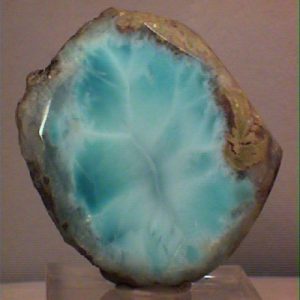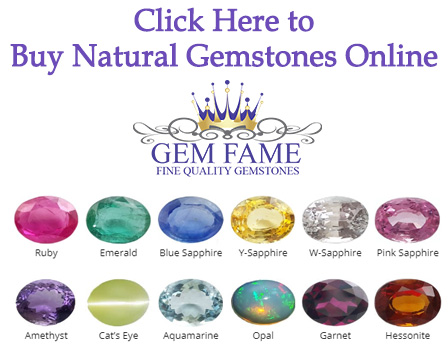Pectolite (Larimar)
Most Pectolite is found as opaque massive material that takes a good shine and is suitable for cabochons. The chemical formula of Pectolite is NaCa2[Si3O8(OH)]. Blue pectolite is more popularly marketed as ‘Larimar’, a trademarked name for a variety of pectolite colored by copper and manganese. Larimar is a beautiful pale to the dark blue type of Pectolite from the Dominican Republic. The blue color is due to copper. Larimar is the trade name for Pectolite only from this location and is considered the best and most beautiful Pectolite cabochon material in the world. Pectolite has a density of 2.74 – 2.88 and a refractive index of 1.59 – 1.645. Several other locations worldwide also produce opaque material suitable for cabochons but these are usually white to grey. Material from Magnet Cove, Arkansas, USA and Greenland is a pale pink due to manganese. The only source of transparent Pectolite crystals that could be faceted is the Thetford Mines, Quebec, Canada. A very small find there in 1973 produced pale blue-green and colorless crystals up to 5 inches long. Only a few faceted gems have been cut from this find and are the only known faceted Pectolite gems known to exist.
| Chemical Formula: | NaCa2[Si3O8(OH)] |
| Crystallography: | Triclinic – Pinacoidal |
| Crystal Habit: | Crystals may be tabular, but also commonly acicular, to 15 cm; radiating fibrous, spheroidal, or columnar; fine-grained, massive. Twinning: Twin axis [010] with composition plane [100], common. |
| Cleavage: | [100] Perfect; [001] Perfect |
| Fracture: | Splintery |
| Tenacity: | Brittle |
| Moh’s Hardness: | 4.5 – 5.0 |
| Density: | 2.74 – 2.88 (g/cm3) |
| Luminescence: | Fluorescent, pink under SW UV, orange-pink under LW UV; may beTriboluminescent |
| Radioactivity: | Not Radioactive |
| Color: | Colourless, white, pale pink, greenish, pale to dark blue |
| Transparency: | Transparent to Translucent, Subtranslucent, Opaque |
| Luster: | Vitreous to Silky |
| Refractive Index: | 1.594 – 1.642 Biaxial ( + ) |
| Birefringence: | 0.037 |
| Dispersion: | Very Weak |
| Pleochroism: | n/a |


